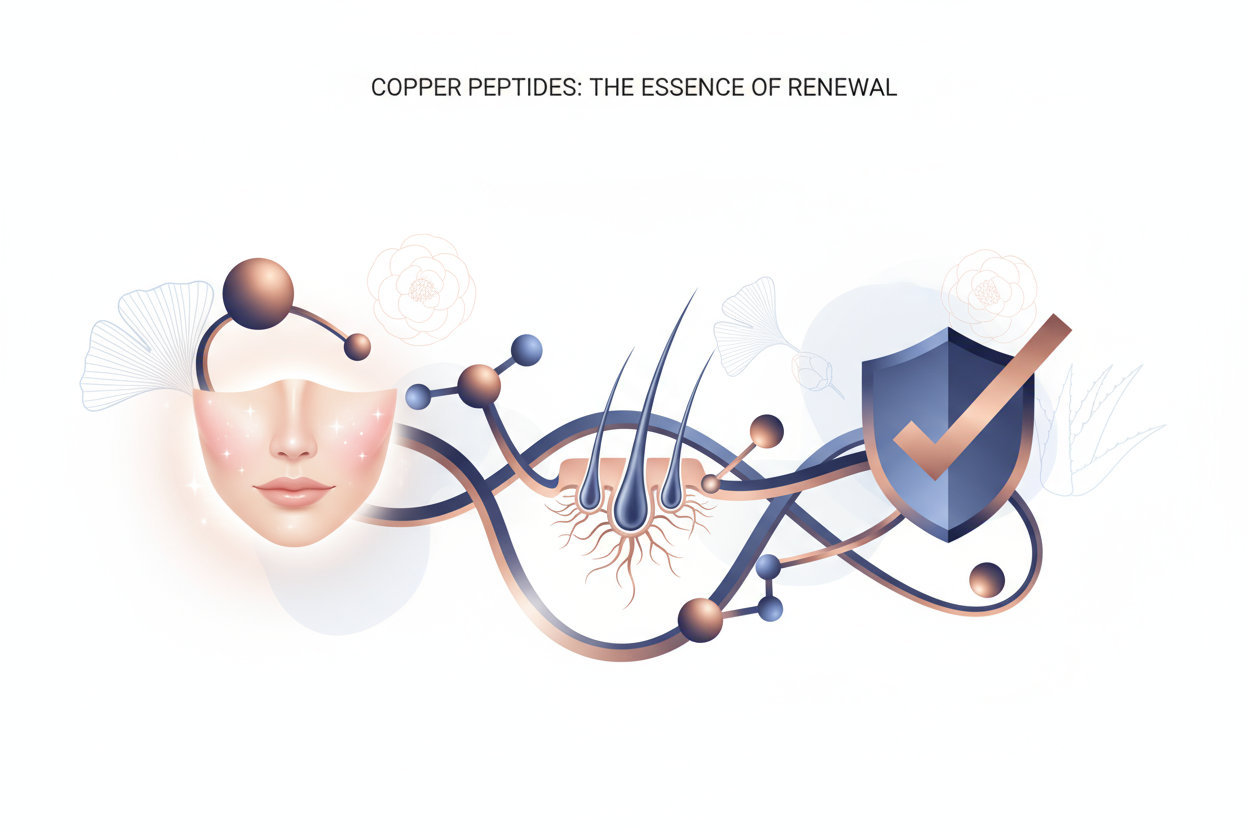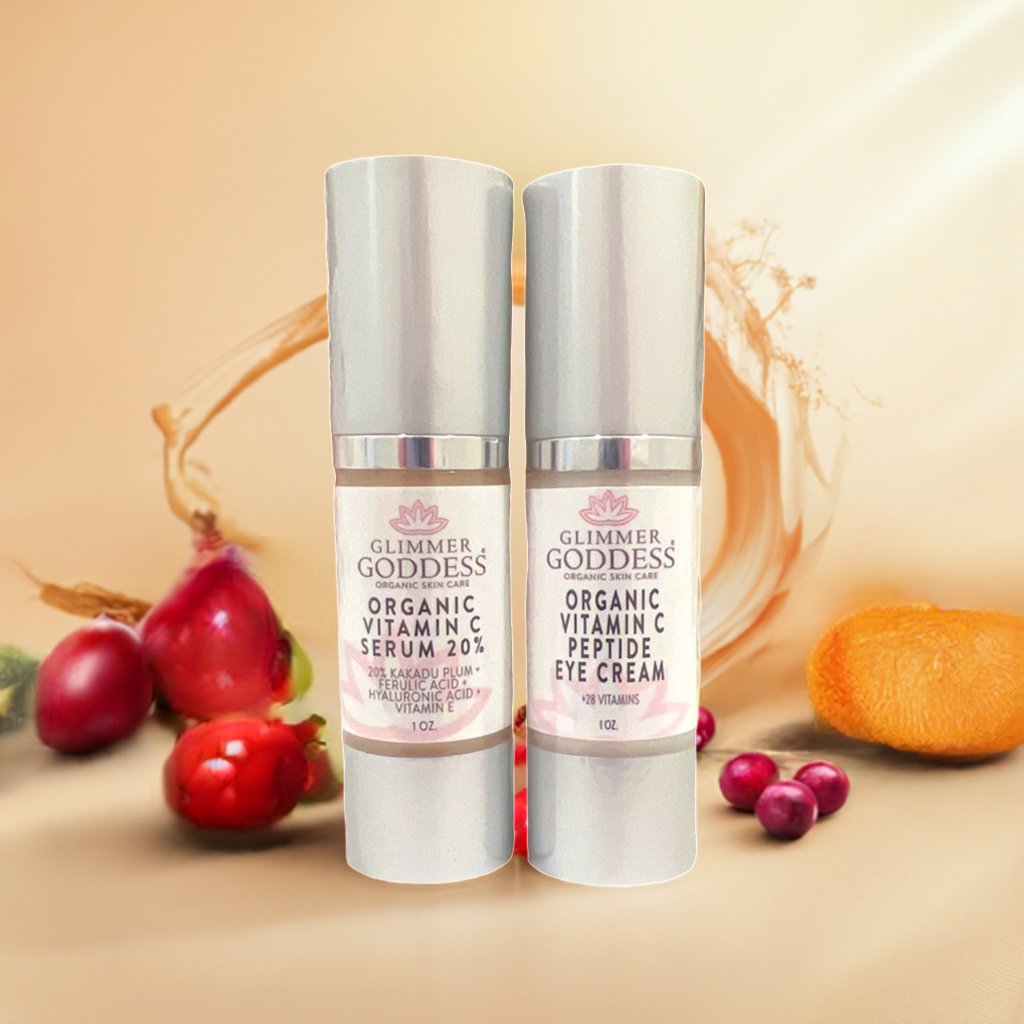
Copper Peptides: Benefits, Hair Growth & Retin-A Safety
Copper Peptides: What They Do, Before & After Results, Hair Benefits, Retin-A Compatibility, DIY Risks, and Injections
Copper peptides have become a go-to ingredient in anti-aging skincare for their role in supporting collagen, promoting skin repair, and helping skin look firmer and more resilient. Below you'll find straightforward answers to common questions people search for about copper peptides, what to expect, how to use them with other actives, and important safety guidance.
1. Copper peptides before and after: what results are realistic?
When people ask about “before and after” results with copper peptides, they want to know how quickly they'll see improvement and what improvements are realistic. Evidence and user reports indicate:
- Short term (2–4 weeks): improved hydration, smoother texture, and reduced redness due to better barrier repair and moisture balance.
- Medium term (6–12 weeks): subtle firming, even tone, and softening of fine lines as collagen synthesis and extracellular matrix support increase.
- Long term (3+ months): noticeable improvements in elasticity and resilience. Results depend on formulation quality and consistency of use.
For a ready-to-use daily option that includes GHK-Cu copper peptides plus hydrating, barrier-supporting ingredients, try the Glimmer Goddess® Organic Copper Peptide GHK-Cu Moisturizer—handcrafted in Texas to deliver clinical-grade benefits safely and effectively.
2. Copper peptides for hair: do they help hair growth and thickness?
Yes—copper peptides are increasingly used in scalp and hair serums to help support hair growth. Research suggests they can:
- Support scalp health by improving circulation and promoting healthy extracellular matrix activity.
- Help strengthen follicles, reduce shedding, and improve thickness when used consistently over several months.
While individual results vary, a 2021 PubMed clinical review notes that GHK-Cu peptides may stimulate fibroblast growth and improve skin and scalp health, which can indirectly benefit hair growth.
3. Copper peptides and Retin-A (tretinoin): can they be used together?
Yes—when layered properly, copper peptides and tretinoin can complement each other. Here’s how to combine them safely:
- Morning/Evening Split: Use your copper peptide moisturizer in the morning and tretinoin at night to minimize irritation.
- Alternate Nights: If your skin is sensitive, apply them on different nights for balance between repair and renewal.
- Barrier Support: Always follow with a hydrating cream to maintain skin comfort and reduce dryness.
The Cleveland Clinic notes that tretinoin can increase skin turnover and dryness—making copper peptides ideal partners to reinforce moisture and strengthen the skin barrier.
4. How to make your own copper peptides: is DIY safe and effective?
Homemade copper peptide recipes circulate online, but professional dermatology experts caution against DIY versions because:
- Stability: GHK-Cu requires precise pH and synthesis conditions; DIY solutions are prone to inactivation.
- Contamination: Without sterile technique, contamination can lead to irritation or infection.
- Efficacy: Formulation errors can prevent peptides from binding correctly to copper ions, rendering them ineffective.
Dermatology Times confirms that lab-grade copper peptide formulations must maintain a controlled environment to preserve potency and safety (source).
5. Copper peptide injections: what are they and are they the same as topical use?
Copper peptide injections are not the same as topical products. Injections are medical procedures performed by licensed professionals, often targeting collagen or tissue regeneration. These carry procedural risks—bruising, infection, or uneven outcomes—and should only be done under medical supervision. Topical peptides, like moisturizers and serums, are safe for daily at-home use.
Practical tips for using copper peptides in your routine
- Introduce slowly—apply every other day for the first week, then increase as tolerated.
- Apply lighter serums first, then peptide creams, and finish with SPF during the day.
- Use sunscreen daily—peptides repair, but SPF prevents future damage.
- Be consistent. Visible firmness and tone improvements typically appear after 8–12 weeks.
Quick FAQ
- Will copper peptides irritate sensitive skin? Usually not; they can actually soothe irritation and redness. Always patch test.
- How soon will I see results? Hydration and smoothness often improve within weeks; firmer texture develops after 2–3 months.
- Are copper peptides vegan/cruelty-free? Many modern formulations, including Glimmer Goddess®, are 100% vegan and cruelty-free.
For an easy way to add copper peptides to your daily skincare, explore our Organic Copper Peptide GHK-Cu Anti-Aging Moisturizer—a lightweight, hydrating cream handcrafted in Texas to deliver visible renewal and skin comfort.

Organic Copper Peptide GHK-CU Anti-Aging Moisturizer
Experience next-level hydration and skin renewal with Glimmer Goddess® Copper Peptide Moisturizer—lightweight, non-greasy, and packed with GHK-Cu to visibly firm and smooth.
View Product →
FAQ
What should you not mix copper peptides with?
Avoid mixing copper peptides with strong acids or high-strength vitamin C in the same routine. Alternate AM/PM use to avoid destabilization.
Do copper peptides work for hair regrowth?
Yes—copper peptides may stimulate follicles and improve scalp circulation, supporting thicker, healthier hair with consistent use.
Can copper peptides and tretinoin be used together?
They can, but apply separately—tretinoin at night, peptides in the morning—to minimize dryness or irritation.
What are the downsides of copper peptides?
Overuse may cause mild irritation or temporary purging. Start slow and always patch test before full application.
This article provides general information and is not medical advice. Consult a dermatologist for personalized recommendations before combining active ingredients or pursuing injectable treatments.



